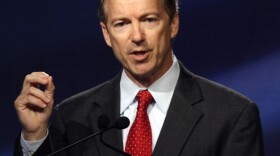Kentucky Republicans will now attend a presidential caucus without the intended guest of honor - Sen. Rand Paul.
Following a lackluster fifth place showing in Monday's Iowa caucuses, Paul announced Wednesday he's suspending his campaign and concentrating on his senate reelection bid back home. Senate Majority Leader Damon Thayer, a vocal champion of the shift from May primary to March caucus, admits the curtain call came sooner than he expected.
"I thought he would stay through New Hampshire, but I respect his decision," the Georgetown Republican says. "I was proud to endorse him for president. I think he has without a doubt become a national voice for the conservative movement."

Republicans opted for the caucus so Paul could run for two offices simultaneously - a move normally prohibited by a state law which bars candidates from appearing on the ballot twice. The junior senator pledged to pay the estimated $400,000 to $500,000 tab for the caucus in 2015, supplying a $250,000 down payment in August. And Senate President Robert Stivers doesn't anticipate any problems paying for the event.
"Now that [Paul] is not involved but has paid his fee and several of the other participants had already paid their fee, I think the expense will be covered. I don't know if it will be as large since there is not a Kentuckian in the field," he tells reporters.
The question now: Minus the inclusion of the original beneficiary, will the caucus attract sufficient interest and prove a worthwhile endeavor for the party? Thayer is optimistic.
"With a competitive Republican primary, we'll have a chance as Republicans to have an earlier voice in the nominating process," he tells WUKY. "And I think the way that the Republican Party has structured it with the delegates being assigned proportionately based on the voting percentage that day, it makes it likely that we'll see some presidential candidates in here before the caucus takes place on March 5."
Stivers says the caucus' success and the chances of adopting the model in the future remain an open question, citing two factors: "participation, which is the number one priority, and then the fiscal realities of meeting the costs."
Predictably unimpressed are state Democrats. House Speaker Greg Stumbo kept his comments pithy, telling reporters, "I never thought Rand Paul should have gotten in the race, but he didn't ask me."
Attention now switches to the state level, where Paul must mount a defense against his chief Democratic rival, Lexington Mayor Jim Gray.
In a statement, Gray said, " Paul spent years preparing for his presidential campaign and then took even more time away from Kentucky to pursue his personal ambitions. Now that he’s failed to catch fire with voters in other states, he’s coming back. Well, we deserve to be more than just a fall back plan. And we certainly deserve a Senator whose focus is on Kentucky, not one focused on planning his next run for President."









